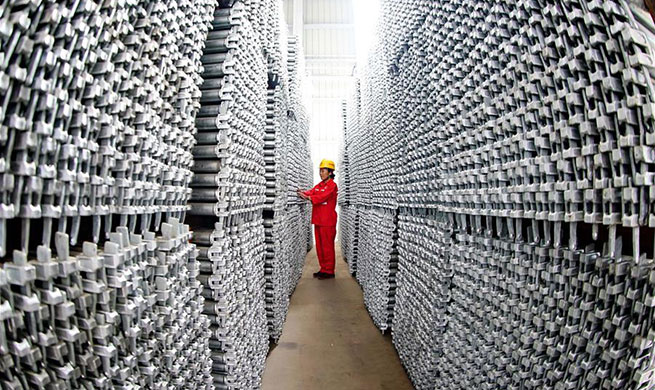BEIJING, Aug. 10 (Xinhua) -- The property markets in major Chinese cities are expected to continue stabilizing, as local governments have been rolling out more control measures.
According to a recently published report, in the southern Guangdong Province, some 65.6 million square meters of commercial houses were sold, with a sales volume of about 833.4 billion yuan (121.6 billion U. S. dollars) during the first half of this year, a drop of 12.1 percent and 1.4 percent respectively from the same period last year.
The metropolis of Shenzhen in Guangdong saw its average transaction price of new houses remain at 54,142 yuan per square meters in July, up by 0.09 percent from June. Previously, the city has seen drops in home price for 21 months in a row since October 2016.
The eastern coastal city of Xiamen, Fujian Province, saw transactions of 10,479 existing houses during the first half of 2018, down by 28.63 percent from the second half of 2017.
According to the National Bureau of Statistics (NBS), housing prices in major Chinese cities remained stable in June. On a yearly basis, new residential housing prices in four first-tier cities including Beijing and Shanghai saw no change from a year ago.
New home prices declined year on year in seven of the 15 "hotspot" cities, where speculative home purchases are monitored, while eight other cities posted growth.
During previous years, rocketing housing prices, especially in major cities, fueled concerns about asset bubbles. To curb speculation, local governments rolled out various measures, such as restricting purchasing homes and increasing the minimum down payment required for a mortgage.
According to Centaline Property research center, over 270 property control announcements were made by different cities and departments in 2017. During the first seven months this year, major cities announced 260 control measures, up by 80 percent from the same period last year.
More controls are on the way, as the central authorities showed firm resolve in regulating the property market at a meeting of the Political Bureau of the Communist Party of China (CPC) Central Committee on July 31.
The meeting said "rises in home prices should be firmly curbed," and that the establishment of a long-term mechanism to promote the stable and healthy development of the property market should be accelerated.
On July 31, Shenzhen released a circular saying that commercial apartments bought by individuals, companies, and public institutions are not allowed to be sold within five years.
Meanwhile, newly-built commercial residential houses and existing houses bought by residents are not allowed to be sold within three years.
Companies and public institutions are not allowed to buy new commercial houses and existing houses for the time being, according to the circular.
On August 6, Shenyang in northeast China's Liaoning Province launched policies to strengthen regulation of the property market, such as expanding the area subject to commercial house purchase restrictions.
The city also announced an increase in the supply of commercial residential houses and land for residential house construction.
On August 8, Chengdu in southwest China's Sichuan Province said that the municipal government will carry out a campaign to crack down on speculation, illegal agents, and illegal activities by developers from August to December.
At a meeting held by the Ministry of Housing and Urban-Rural Development in Shenyang on August 7, local governments across China were ordered to analyze the problems and major risks existing in their respective housing markets and implement tailored measures to stabilize the market expectation.
Mao Shengyong, NBS spokesperson, said the property market still has some structural problems, as several third- and fourth-tier cities have experienced price spikes since the beginning of the year, and some remote areas are facing housing inventory oversupply.
Therefore, more targeted and individualized control measures should be adopted by different cities, he said.
Jia Kang, chief economist at the China Academy of New Supply-side Economics, said, on the one hand, governments should offer more subsidized rental houses and shared ownership houses for low-income groups, while on the other hand, more higher-end housing should also be provided to meet market demand.

















